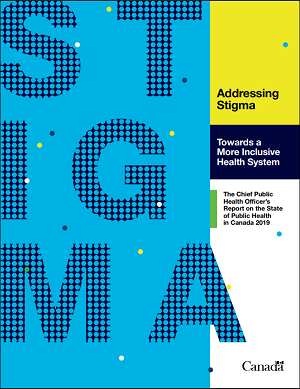January 2020 · Issue 255
In this issue:
- The National Collaborating Centre for Methods and Tools’ Partnerships and Collaborations
- NEW CPHO Report - Addressing Stigma: Towards a more inclusive health system
- New publication
- Webinars
- From the Repositories
- From the National Collaborating Centres
- From our Partners
The National Collaborating Centre for Methods and Tools’ Partnerships and Collaborations

The National Collaborating Centre for Methods and Tools (NCCMT) is a proud partner and collaborator with public health organizations, knowledge translation groups, academic institutions and public health researchers in Canada.
- We are hosted by the School of Nursing at McMaster University in Hamilton, Ontario. Go Marauders! Some recent collaborations include:
- McMaster Optimal Aging Portal, a website for research-based information to help you age well and manage your health conditions. The NCCMT’s Scientific Director, Dr. Maureen Dobbins, RN, PhD, is one of five leads of the McMaster Optimal Aging Portal.
- Division of eLearning Innovation (DELI), an innovative e-learning group. Click here to watch our recent webinar on the iGeriCare platform.
- The NCCMT hosts Health Evidence™, a freely searchable repository of pre-appraised systematic reviews on the effectiveness of public health interventions. People from every country in the world access Health Evidence™ each year!
- We are a partner organization in Public Health Training for Equitable Systems Change (PHESC) which offers training and learning opportunities in equity, population health assessment, and effective public health practice.
- The NCCMT engages with the Canadian Institutes of Health Research (CIHR) Applied Public Health Chairs
- We are collaborating with Dr. David Buckeridge at McGill University to use Artificial Intelligence to pair surveillance data with research evidence in a pilot database.
- We engage with post-secondary public health schools and programs to share the NCCMT’s freely available resources and to deliver presentations on evidence-informed decision making to graduate programs across the country, such as McMaster University, University of Guelph, University of Western Ontario, Memorial University of Newfoundland and University of Regina.
- We are generously funded by the Public Health Agency of Canada and we partner with them on a number of activities. We recently presented a webinar for regional managers to provide an overview of evidence-informed public health and resources to support integration of evidence. We also gave a workshop to the Annual Report Unit in the Chief Public Health Officer’s office.
- The NCCMT is one of six National Collaborating Centres in Canada. Each year the National Collaborating Centres work together on several projects. Stay tuned to this newsletter for more information on our collaborations with our sister National Collaborating Centres.
Contact us at nccmt@mcmaster.ca to learn about how we can support you or to request a presentation!
Do you have an upcoming event or new product? Contact us at nccmt@mcmaster.ca to request us to promote it in this newsletter.
NEW CPHO Report - Addressing Stigma: Towards a more inclusive health system

Canada’s Chief Public Health Officer has released her latest report on State of Public Health in Canada 2019, Addressing Stigma: Towards a More Inclusive Health System. This report provides a snapshot of the health status of Canadians, and then focuses on understanding the impact of stigma on our health, as well as how we can reduce it across health systems.
Stigma creates barriers for those who are most in need from accessing services and getting effective care. We all have a role to play in ending stigma in order to move towards a more inclusive health system.
Looking for reviews on the effectiveness of interventions addressing stigma? Explore a selection of high quality reviews from the last five years from Health Evidence™ below. Please note, the reviews are only available in English.
- Self-stigma reduction interventions for people living with HIV/AIDS and their families: A systematic review
- Effectiveness of information and communication technologies interventions to increase mental health literacy: A systematic review
- Interventions to reduce stigma towards people with severe mental illness: Systematic review and meta-analysis
- Community health worker interventions to promote psychosocial outcomes among people living with HIV – A systematic review
- Evidence for effective interventions to reduce mental health-related sigma and discrimination in the medium and long term: Systematic review
Click here to read the CPHO report.
New publication
The National Collaborating Centre for Methods and Tools’ Scientific Director, Dr. Maureen Dobbins, RN, PhD, co-authored a paper in Global Qualitative Nursing Research, ‘Nurse-Family Partnership and Geography: An Intersectional Perspective’.
Click here to read the article.
Webinars
These events will be presented in English. French presentation slides are available before the events upon request; please email us at nccmt@mcmaster.ca.
%20300%20px%20width.png)
Spotlight on Knowledge Translation (KT) Methods and Tools
Online Course on Health Impact Assessment (HIA): A Tool for Developing Healthy Public Policies
February 13, 2020
2:00-3:00 pm (EST) (webinar presented in English)
February 20, 2020
2:00-3:00 pm (EST) (webinar presented in French)
In this webinar, we will present the HIA process as a tool for promoting the adoption of healthy public policies. We will also introduce the NCCHPP’s online course on HIA as a tool to support HIA capacity building. A health professional will speak about her HIA experience on its challenges and benefits, as well as her experience with the NCCHPP’s online course.
Click here to register for the February 13 session (presented in English).
Click here to register for the February 20 session (presented in French).
Quality Assessment of Community Evidence (QACE) Tools
March 9, 2020
1:00-2:00pm (EDT)
Join us in launching the NCCMT’s new tools for assessing the quality of community evidence. These tools can be applied to evidence for local health issues and context, such as surveillance data and community health status reports, as well as evidence for community and political preferences and actions, such as the expressed needs and interests of community members and support from public or government officials.
Click here to register
Action on health equity through early childhood development programs, measurement and policy
March 18, 2020
1:30-2:30 pm (EDT)
This webinar will explore the Community Planning tool: Applying a health equity lens to program planning resource available from Fraser Health Authority in British Columbia. The resource will serve as an example of how to apply a health equity lens to complement current program planning practices. Speakers will reflect on practical examples where this tool has been applied and offer guidance on how to approach each of these steps. This webinar is co-hosted by the National Collaborating Centre for Determinants of Health (NCCDH) and the National Collaborating Centre for Methods and Tools (NCCMT).
Click here to register.
![]()
Peer-to-Peer Webinar Series: Success Stories in Evidence-Informed Decision Making
Promoting evidence-based food handler legislation in York region
February 26, 2020
1:00-2:00 pm (EST)
Presented by: Caitlyn Paget and Chetna Pandya
Prior to 2018, food handler certification was not mandatory in Ontario. As such, some municipalities developed their own bylaws. Learn more about how the Regional Municipality of York explored and implemented a bylaw in their region mandating food handler certification for food premises.
Click here to register.
Click here to read the full story in the third issue of the Evidence-Informed Decision Making Casebook.
Community health data website: Driven by the local needs in British Columbia
March 3, 2020
1:00-2:00 pm (EST)
Presented by: Dr. Drona Rasali
The Population and Public Health team at the BC Centre for Disease Control undertook a project to support the integration of data into the community health planning process in British Columbia. Learn more about the creation and implementation of the Community Health Data website and its associated resources.
Click here to register.
Click here to read the full story in the third issue of the Evidence-Informed Decision Making Casebook.
From the Repositories
The National Collaborating Centre for Methods and Tools (NCCMT) hosts three knowledge repositories to share knowledge on what works in public health.
Explore the selections below for methods, tools, and research, to support you in your public health practice.
Registry of Methods and Tools
- Assessing transferability of health interventions with the PIET-T
- ROBIS: A Risk of Bias Assessment Tool for Systematic Reviews
Health Evidence™
Please note, articles from Health Evidence™ are only available in English.
- Evaluation of school-based interventions of active breaks in primary schools: A systematic review and meta-analysis
- Research review: Effectiveness of universal eating disorder prevention interventions in improving body image among children: A systematic review and meta-analysis
Public Health+
Please note, articles from Public Health+ are only available in English.
From the National Collaborating Centres
.jpg)
- Upcoming webinar! Join the National Collaborating Centre for Indigenous Health for their upcoming webinar on February 11th, At the interface: Indigenous health practitioners and evidence based practice. Click here to register.
- The National Collaborating Centre for Healthy Public Policy has recently updated a section of their Structural Profile of Public Health in Canada that provides information on the governmental and para-governmental structures dedicated to Indigenous health at the provincial or territorial level, and at the local/regional level within each province and territory. Click here to access the Structural Profile of Public Health in Canada: Indigenous Health.
- Check out the News section of the National Collaborating Centres for Public Health’s website to learn what all six NCCs are up to!
From our Partners
- Upcoming course from the Knowledge Translation Program at the Li Ka Shing Knowledge Institute – Practicing Knowledge Translation! Applications are due February 28th, 2020. Click here for more information and to apply.
- The KT Canada Summer Institute, taking place in Ottawa, Ontario in June, is accepting abstracts until March 2nd. Click here to learn more and submit your abstract.

